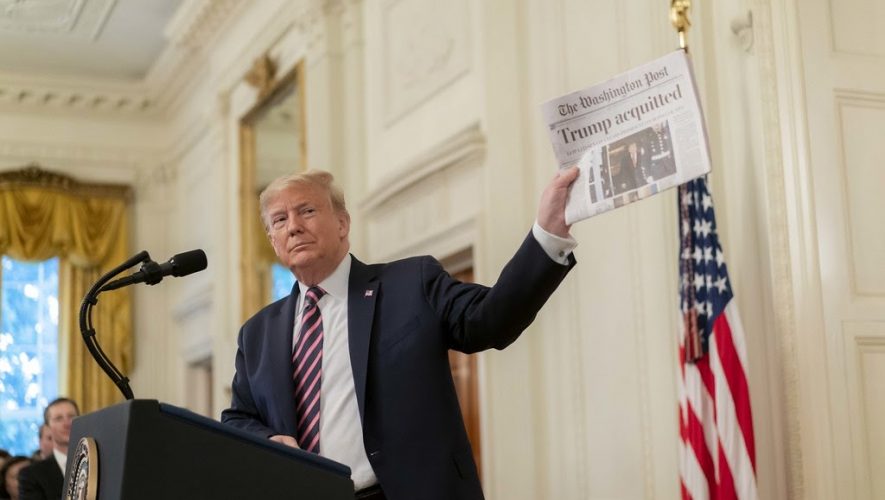Following the Capitol insurrection on January 6, former President Donald Trump has come under intense scrutiny for inciting the riots in the nation’s capital.
Shortly after the attack—which left many injured and five dead—House Democrats delivered a second article of impeachment in an unprecedented display of disdain. The Democrats attempted to establish that Trump was personally responsible for the storming, which happened after Trump repeatedly denied the 2020 election results.
Trump spread a false narrative of voter fraud on Twitter, ultimately issuing a call to action, on the day of the insurrection. Twitter permanently banned him two days later “due to the risk of further incitement of violence.”
Despite this blatant attack on democracy, many members of Congress voiced concerns that the impeachment was distracting from the beginning of the Biden administration. Impeachment, however, was a necessary step toward restoring democracy and the fundamental values that America prides itself on.
After complaints from members of Congress, Senate Minority Leader Mitch McConnell announced that the impeachment trials would resume on February 9. McConnell defended his decision, stating that “this impeachment began with an unprecedented fast and minimal process over in the House. The sequel cannot be an insufficient Senate process that denies former President Trump his due process or damages the Senate or the presidency itself.”
Republican Senator Lindsey Graham, a close ally of Trump, also agreed that the bipartisan decision to delay the impeachment trial was fair, saying “It allows the president’s defense team adequate time to prepare and for the sake of the country, it moves the process forward.”
This delay allowed the Senate to continue confirming Biden’s cabinet picks. Thirteen of Biden’s twenty-three appointments have been confirmed, with hearings still going. Senate Democrats compromised on the delay, agreeing that it would give Biden the room to begin moving his legislative agenda forward before the trial. Biden agreed, stating, “The more time we have to get up and running to meet these cries, the better.”
It is vital to maintain a fair process even during the impeachment trial of a man who has spread false claims about the legitimacy of the election. But it is equally important to keep the legislative ball rolling in Congress too.
Rather predictably, Trump was acquitted just five days after the trial began. He still remains a dominant figure in the GOP, and most of his fellow Republicans voted to acquit him. McConnell did too, though he reprimanded Trump for his actions in a speech after the trial. In true Trumpian fashion, the former president fired back, stating that the Senate minority leader was a “dour, sullen, and unsmiling political hack.”
However, Senator Bill Cassidy of Louisiana, one of seven Republicans who voted to convict, explained that he did so because “our Constitution and our country is more important than any one person. I voted to convict President Trump because he is guilty.”
The Republicans who voted in favor of impeachment did so to save face and distance the party from Trump. Senate Majority Leader Chuck Schumer stated that the trial “was about choosing country over Donald Trump, and forty-three Republican members chose Trump . . . It should be a weight on their conscience today, and it shall be a weight on their conscience in the future.”
Surprisingly, Senate Democrats declined to call any witnesses to testify against Trump. Stacey Plaskett, a congressional delegate from the Virgin Islands and impeachment team member, told CNN, “We didn’t need more witnesses, we needed more senators with spines. We believe that we proved the case, we proved the elements of the article of impeachment.”
Despite criticism toward the trial itself, the Senate should have convicted Trump with or without witnesses. Trump’s conviction was imperative to setting a precedent that inciting an insurrection would be punished. Not only were Trump’s election fraud claims false, they clearly encouraged violence and destruction in protest of the election results. Trump may have even wanted this violent outbreak to occur, and he should have been held accountable for his actions.
The Capitol stormers fell prey to the alt-right extremism touted by the Trump administration. This variant of right-wing populism had not been cultivated by a president before, and steps should have been taken to dissuade similar mobilization in the future. A conviction would have prevented Trump from running for office again and demoted his political status even further. And though a conviction wouldn’t require a finding of unconstitutionality, it would have acknowledged that Trump’s words strayed past the realm of acceptable political discourse.
To convict him, the Senate would have had to agree that Trump’s language and rhetoric incited the riots. This proved incredibly hard to demonstrate. Trump’s legal team argued that his words were protected by the First Amendment; Senate Democrats had to prove that Trump had directly incited the violence, which is an impeachable offense.
The basic argument was that Trump had encouraged supporters to fight for the false narratives of institutional corruption he himself had created and spread both online and in speeches.
“You don’t concede when there’s theft involved . . . We’re going to walk down to the Capitol, and we’re going to cheer on our brave senators, and congressmen and women. We’re probably not going to be cheering so much for some of them because you’ll never take back our country with weakness. You have to show strength.”
–Donald Trump, hours before the Capitol storming
Trump directly instigated and encouraged the riot, which is what the prosecutors and pro-conviction senators attempted to prove throughout the trial.
Although the Senate ultimately failed to convict him, Trump’s acquittal should be a wake-up call for the nation, a reminder of the importance and impact of the president and their words. The inexcusable behavior of Trump supporters at the Capitol is a true testament to this.
I also hope that the impeachment process can inform dedicated Trump supporters of the true severity of the former president’s actions and his abuse of presidential power. Respectable and honorable leaders must reside in the Oval Office. The people need a president that they trust will not promote false information and sow discord. Americans haven’t had this over the past four years.
It is critical that Biden sets an example as an honorable and honest leader. The president is not only the commander-in-chief, but also the representative of our country. Who we choose says a lot about who we are.
Preserving and respecting democracy is something that both Democrats and Republicans should be devoted to regardless of partisanship. The impeachment process is an essential first step to promoting American democracy. When words and false claims lead to violence, it is necessary that actions be taken to hold leaders accountable.
I hope that we can close this chapter and move forward as a nation. We are still far from being free of extreme polarization, but this is a step in the right direction. Hopefully the trial alone will influence people to value fact over false narratives.



